Testing The Temperature 7
What do voters in Northern Ireland think about the Protocol on Ireland/Northern Ireland?
David Phinnemore, Katy Hayward and Lisa Claire Whitten [1]
February 2023
The report is available to download here:
Executive Summary
- Opinion among voters in Northern Ireland on the Protocol on Ireland/Northern Ireland continues to be deeply divided, with only a small proportion of respondents having ‘no opinion’ on the topic.
- A majority (53%) currently see the Protocol, with grace periods, as an appropriate means for managing the effects of Brexit on Northern Ireland and 52% as overall ‘a good thing for Northern Ireland’; 38% and 41% of respondents respectively are of the opposite view.
- Over two thirds of respondents (70%) believe that particular arrangements for Northern Ireland are necessary to manage the impact of Brexit.
- Almost 6 in 10 respondents (59%) do not think that Brexit is overall ‘a good thing’ for the United Kingdom.
- The most negative views on the perceived current impact of the Protocol are in relation to its political implications and most positive are on its economic consequences.
- 50% think the Protocol is having a positive impact on the Northern Ireland economy, and 62% think it offers unique opportunities that could benefit Northern Ireland.
- 65% think it is having a negative impact on political stability in Northern Ireland and 58% think the same about its impact on British-Irish relations.
- 44% think the Protocol is positive for the 1998 Belfast (Good Friday) Agreement whilst 43% think it is having a negative effect on it.
- 50% think the Protocol is having a negative impact on Northern Ireland’s constitutional place in the UK and 48% see it as negative for Northern Ireland place in the UK internal market.
- 58% of voters in Northern Ireland have concerns about the full operational scope and impact of the Protocol; 35% do not have concerns about the Protocol were it to be fully implemented with no adjustment after the grace periods.
- Among those who have concerns, customs declarations for parcels are the issue of most concern (37% of respondents overall are ‘highly concerned’) followed by restrictions on plants and seeds and the jurisdiction of the EU Court of Justice under the Protocol (37% of respondents overall are ‘highly concerned’).
- The issue of least concern is Northern Ireland aligning with the EU’s standards for the production of goods. 28% of respondents overall are ‘highly concerned’.
- Almost a third of respondents overall (31%) are ‘highly concerned’ about checks in Northern Ireland ports to ensure rules regarding the protection of the EU market are being followed.
- There are mixed levels of trust/distrust in political actors and institutions when it comes to managing Northern Ireland’s interest with respect to the Protocol.
- The UK government is by far the most distrusted (85% distrust including 48% strongly distrust) and least trusted (3% trust) of all actors.
- Voters in Northern Ireland are split on whether to trust (44%) or distrust (44%) the European Commission/EU.
- In a change from previous polls, the Irish government is now more distrusted (46%) than trusted (38%).
- The Alliance and SDLP are the most trusted of the five parties (respectively 44% and 43% trust, and 43% each distrust).
- The DUP remains the most distrusted (67%); it is trusted by 26% of respondents.
- Northern Ireland business representatives continue to be the only actors who enjoy the trust of a majority of respondents (56%) in managing Northern Ireland’s interests with respect to the Protocol.
- Most voters do not rank the Protocol among their highest policy concerns when compared to five other current issues.
- The issue of most concern to voters is the health service (42%) followed by and the economy/cost of living (31%). Three-quarters of voters place these issues as first and/or second in their ranking of concerns.
- The Protocol is ranked as their top concern by 22% of respondents; twice as many respondents (44%) rank the Protocol as the issue of least concern to them.
- Female respondents are four times more likely to rank the Protocol as the issue of least (54%) as opposed to most (13%) concern to them; male respondents are split almost evenly – 34% with the Protocol as of least concern, 31% with it as of most concern.
- 55% of DUP supporters rank the Protocol as the issue of most concern to them; three quarters of Alliance (75%) and SDLP (76%) supporters rank the Protocol as the issue of least concern to them.
- Self-declared understanding of the Protocol remains high, with a substantial majority of respondents (76%) claiming ‘a good understanding’ of the Protocol.
- Most voters want Northern Ireland to be more involved in decisions regarding the implementation of the Protocol.
- Almost three quarters (73%) of respondents agree that the UK and the EU should commit to regular consultation with Northern Ireland stakeholders and political representatives on how the Protocol is implemented; this includes majorities from supporters of all Northern Ireland political parties except for the TUV.
- A clear majority of respondents (71%) from across all parties agree that representatives of the Northern Ireland Assembly should be included in the work of the UK-EU Parliamentary Partnership Assembly.
- Respondents remain split on how their MLAs should vote in the 2024 ‘democratic consent’ vote.
- Half (51%) of respondents currently favour MLAs voting for the continued application of the Protocol; 41% want MLAs to vote against.
- In an election to the Northern Ireland Assembly, a candidate’s position on the Protocol would be important for 82% of respondents; just over a third would vote for candidates who either oppose consent in 2024 (12%) or who are in favour of scrapping the Protocol (22%).
- Over a third of respondents (36%) would vote for candidates in favour of consent; a further 12% would vote for candidates in favour of consent provided the UK and the EU agreed to minimal GB-NI checks and controls.
- If the UK and the EU agreed a reduction of checks and controls on GB-NI movements of goods, the proportion of respondents in favour of consent in 2024 would rise to 43%, with a further 27% favouring consent depending on whether the checks and controls were minimal (10%) or the implications for Northern Ireland’s economy (17%).
- Respondents are clear that the Northern Ireland Executive should be re-established.
- Almost two thirds of respondents (64%) agree that the Northern Ireland Executive should be fully functioning regardless of what happens with the Protocol. Almost a third (32%) disagree.
- 61% disagree that the Protocol should be ‘removed’ before power-sharing is restored; a third (34%) agree.
- A majority of respondents (61%) agreed that a Northern Ireland Assembly election should not be postponed again regardless of what is happening in UK-EU talks on the Protocol. This question was asked prior to the Secretary of State’s decision to do so.
Introduction
As part of a three-year ESRC-funded research project on the Protocol on Ireland/ Northern Ireland, a series of regular surveys has been commissioned to ‘temperature test’ voter attitudes on a range of issues relating to Brexit, the Protocol, and their implications for Northern Ireland. This is the only polling in Northern Ireland dedicated to the topic of the Protocol and which has been running at regular intervals since the Protocol entered fully into force on 1 January 2021 following the end of the transition period.
The surveys are being conducted every four months during 2021-2023 by LucidTalk using its online Northern Ireland Opinion Panel. This means that the survey is not based on systematic random sampling across Northern Ireland society. Instead, it is a reliable indicator of the opinion of Northern Ireland voters who take an interest in current affairs and politics, and who are likely to exercise their right to vote.
LucidTalk have a strong track record of accurately predicting election and referendum results in Northern Ireland on the basis of polling this Opinion Panel. The results presented here are from a sample of 1498 responses to the survey undertaken on 3-6 February 2023. The sample of responses used is weighted to be representative of the adult population of Northern Ireland (e.g. by age, gender, region). All results presented are accurate to a margin of error of +/-2.6% at 95% confidence.
The context for this poll
This seventh survey was conducted two years after the end of the 11-month transition period that followed the UK’s withdrawal from the EU on 31 January 2020. It was the first survey of 2023 and the seventh of the nine surveys scheduled for 2021-2023, and followed previous surveys in February 2022, June 2022 and October 2022 and in March 2021, June 2021 and October 2021.
As with previous polls, the survey was conducted in a context of ongoing contestation around the Protocol, but on this occasion with the UK government and the EU in discussions on addressing issues and with a steady flow of reports of progress being made. Indeed, there was increasing press speculation that a deal resolving a range of issues could soon be reached. However, the survey took place before anticipation mounted in the second week of February that a deal was imminent.
In the period since the previous survey there had been a notable improvement in the mood surrounding UK-EU relations generally and with regard to finding joint solutions to ongoing issues concerning the Protocol, even if there remained scant detail in the public domain of what progress was being made in talks between officials. Key to the improved atmosphere was the more cooperative approach towards the EU of first the short-lived government of Liz Truss and then of its successor with Rishi Sunak as Prime Minister; both administrations indicated an genuine desire to find a ‘negotiated solution’ to issues with optimistic comments being made in November 2022 expressing confidence that issues could be resolved.
Evidence of the improved atmosphere and indeed a contributing factor to it included the UK government’s relaxed attitude to the slow passage through parliament of the Northern Ireland Protocol Bill (NIPB). On the EU side, meanwhile, infringement proceedings launched in the summer in response to the NIPB appeared to have been placed on hold. There was also evidence of progress towards addressing and resolving some issues. In December 2022 the EU announced a three-year extension to the grace period for ensuring UK compliance with EU legislation regarding the movement of veterinary medicines into Northern Ireland. In January 2023, the UK-EU reached agreement on EU access to UK databases for monitoring movements of goods from Great Britain into Northern Ireland. This was seen as a significant development and opened the way for progress in talks between UK and EU officials.
In Northern Ireland, however, the improved atmosphere in UK-EU relations and reports of progress towards resolving Protocol issues had no apparent impact on resolving the ongoing issue of a lack of functioning Assembly and Executive other than providing a reason for the Secretary of State to avoid a decision on calling an new election for the Northern Ireland Assembly election. A delay of almost a year was announced after the poll.
Respondents to the poll on 3-6 February 2023 were asked six sets of questions and offered the opportunity to provide written comments in response to the poll. The questions covered attitudes towards Brexit and the Protocol, assessments of the impact of the Protocol, issues of concern, the relative importance of the Protocol against other concerns, and trust in different actors to manage Northern Ireland’s interest regarding the Protocol. The survey also asked participants how they would like members of the Northern Ireland Assembly (MLAs) to vote in the ‘democratic consent’ vote on Articles 5-10 of the Protocol that will be held at the end of 2024 and the importance of the Protocol for any future Northern Ireland Assembly election. A final section included questions on whether the UK should pursue closer relations with the EU to resolve issues related to the Protocol, UK-EU engagement with Northern Ireland stakeholders and on the significance of the Protocol for the formation of a Northern Ireland Executive.
Attitudes to Brexit and the Protocol
Current opinion on Brexit and the Protocol continues to be divided and generally consistent with the previous Testing the Temperature polls held in 2021 and 2022. The small increases in more positive opinion of the Protocol (initially identified in October 2021) are once again seen in this latest poll.
Three quarters of respondents claim a ‘good understanding’ of the Protocol (see Figure 1). The proportion of respondents who think that reliable information exists on the Protocol (46%) is in line with levels recorded in 2022 (44-47%) and above the lowest level recorded to date of 37% in March 2021.
In line with previous polls, over two thirds of respondents agree that ‘particular arrangements’ for Northern Ireland are needed to manage the effects of Brexit. On this occasion, as in October 2022, 70% are of such a view compared to 72% in June 2022 and 67% in February 2022. The proportion of all respondents being strongly of this view (48%) is in line with the rise noted in June 2022 (to 50%) from the February 2022 poll (44%). There continues to be a clear majority (59%) who disagree that Brexit is on balance ‘a good thing for the UK’ with 51% being strongly of that opinion. The figures are down on October 2022 (62% and 54% respectively) and in line with June 2022 (59% and 50% respectively). As in October 2022, one third of respondents (34%) agree or strongly agree that Brexit is on balance ‘good’ for the UK; this is in line with the 32-36% figures from polls in 2022.
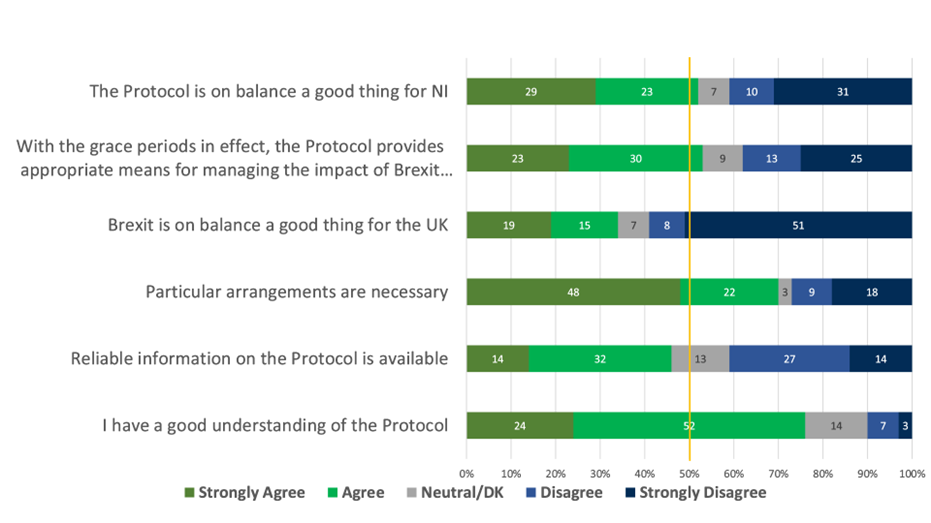
Figure 1. Opinion of Brexit and the Protocol[2]
The proportion of respondents who agree or strongly agree that, with grace periods in effect, the Protocol provides an appropriate means for managing the effects of Brexit for Northern Ireland stands at 53%, so in line with the 54% from October 2022. This compares with the June 2022 figure of 55%, although importantly the question on that occasion did not reference the grace periods being in effect. A small majority of respondents (52%) regard the Protocol as ‘on balance, a good thing’ for Northern Ireland. This is in line with the four previous polls (50-53%). In June 2021, the figure was lower at 43% (see Figure 2). In terms of respondents disagreeing with the proposition, the overall figure of 41% represents an increase on the two previous polls in October 2022 (39%) and June 2022 (37%).
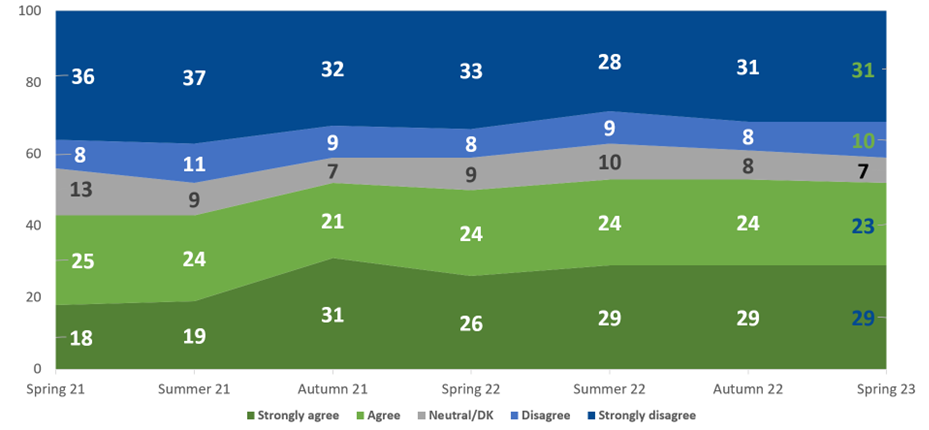
Figure 2. Is the Protocol, on balance ‘a good thing’ for Northern Ireland?
Slender majority acceptance of the Protocol – with grace periods in place – is also reflected in responses to the question on whether the Protocol provides Northern Ireland with a ‘unique set of post-Brexit economic opportunities compared to the rest of the UK which if exploited could benefit Northern Ireland’. Three-fifths of respondents (62%) agree that there are economic opportunities from the Protocol. The figure is lower than in June 2022 (65%) but in line with polls since October 2021 (62%) that recorded notable increases from March 2021 (50%) and June 2021 (56%). Over a quarter of respondents (29%) disagree; a figure slightly higher than in the four previous polls (25-28%), but again lower than in June 2021 (34%).
Views on the impact of the Protocol
The survey asked respondents for their assessment of the current impact of the Protocol. Important to note here is that grace periods for the application of some of the Protocol’s provisions are in place and various formalities, checks and controls on the movement of goods into Northern Ireland from Great Britain are either not being implemented or only being implemented partially.
Opinions remain divided on the impact of the Protocol (see Figure 3). Around three fifths of respondents (65%) see the Protocol impacting negatively on political stability in Northern Ireland. This is in line with the 64% from February 2022 and so up on the 62% seen in October 2022 and the 59% from June 2022 and October 2021. The highest figure to date for a negative impact on political stability was in June 2021 (68%).
The Protocol’s current impact on British-Irish relations and UK-EU relations is regarded by around three fifths of respondents (58% and 57%) as negative, figures that are down on October 2022 (60% and 61% respectively) and the findings of the previous three polls. In June 2021, the figures were higher at 67% and 70% respectively.
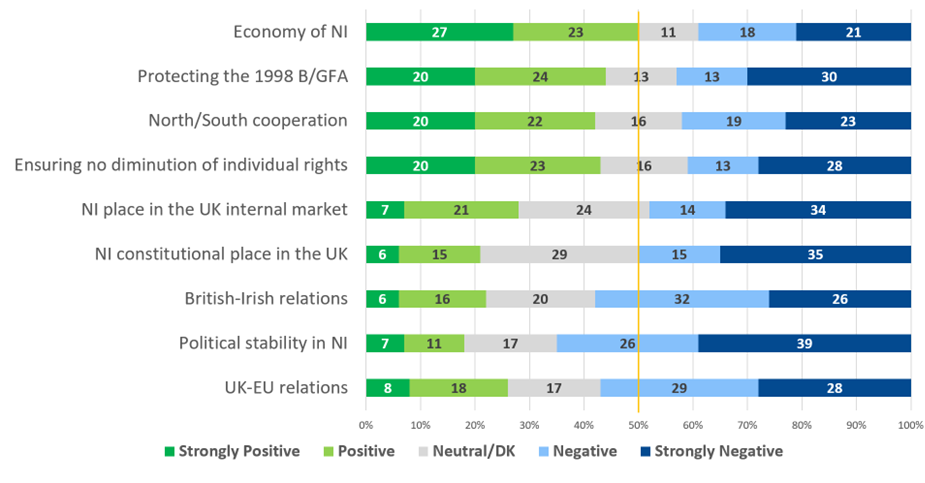
Figure 3. Overall assessment of the current impact of the Protocol[3]
The proportion of respondents seeing the Protocol’s current impact as negative on Northern Ireland’s constitutional position in the UK (50%) confirms the slight rise noted in October (49%) compared to the June 2022 poll (46%); the proportion seeing the Protocol’s current impact on Northern Ireland’s place in the UK internal market as negative (48%) is marginally up on October 2022 (47%). The proportions remain lower than in the October 2021 poll (when they were 57% and 54% respectively).
On the impact of the Protocol on ensuring ‘no diminution’ of individual rights as set out in the 1998 Agreement, the gap between those who see the current impact of the Protocol as positive (43%) and those who view the current impact as negative (41%) has once again narrowed compared to June 2022 (48% positive and 37% negative respectively). In October 2022 the gap was six percentage points.
As in the previous polls, opinions have shifted on other topics. On the question of the impact of the Protocol of the economy of Northern Ireland, half of respondents (50%) currently view it as positive (down on 51% in October and 55% in June 2022). Almost two-fifths (39%) view the impact as negative. Compared to previous polls there has been a further drop in the proportion of respondents viewing the current impact of the Protocol on protecting the 1998 Agreement as positive. In June 2022 half of respondents viewed the impact as positive (50%). This fell to 47% in October 2022 and now stands at 44%. The proportion of respondents who view the impact as negative has risen to 43%. As for north-south cooperation, the gap between those viewing the current impact of the Protocol as positive as opposed to negative – narrowing in October 2022 (45% positive against 41% negative) – has now disappeared to 42% of respondents being for each view. This contrasts with June 2022 when 49% of respondents viewed the impact as positive against 37% who viewed it as negative.
Written comments expressing positive and negative views
Views expressed in the optional written comments section of the poll were also divided. It is important to note that the reporting of these comments is not weighted to be representative.[4]
Within those expressing negative views of the Protocol, most are opposed to it in principle while a smaller proportion oppose its practical implications. Among the comments opposing the Protocol in principle were:
“Scrap the Protocol NOW”
“The Protocol is an immoral attack on Northern Ireland’s status under the Belfast Agreement, strongly divisive, and prejudicial to political cooperation within Northern Ireland”
“The Protocol rips up the Act of Union and the Belfast Agreement Principle of Consent. It simply has to go.”
“The Protocol must be scrapped/ NI must be fully integrated into the UK economy. The border must remain a land border and there should be no sea border. Brexit must be fully delivered to NI as voted for.”
“The Protocol is not acceptable under any guise and must go. Northern Ireland is every bit an equal part of the United Kingdom as Scotland, Wales and England and should be treated as such.”
And for negative in effect:
“I run a small retail business and we find the paperwork really bad since Brexit. I am upset that we are treated differently to the rest of the UK.”
“The probable impact of ending Article 9 of the Protocol has not been communicated to the NI public. Ensuring that article is implemented is part of my job and the separation of the electricity market on cost of living in NI has not been mentioned (particularly by those who want a hard border)”
“I am fed up with GB companies who have taken a commercial decision not to supply NI customers because the volume of business they do here doesn’t justify setting up systems to cope with the Protocol. The UK should pass a law obliging them to do so.”
Among those who hold a positive view of the Protocol, some see it as a ‘least-worst’ mitigation in the context of Brexit; others see it as potentially beneficial for Northern Ireland if it can be implemented well, this group often links this to the need for political stability; more see the Protocol as already beneficial for Northern Ireland.
“The Protocol has the ability to ensure a positive surge and growth of the economy in NI compared to [the] rest of the UK”
“The Protocol is a good thing for Northern Ireland.”
“Unionism has missed a golden opportunity to be to the forefront of boosting NI economy because of the Protocol”
“Brexit was bad, NI voted against it, and it was forced on us. The Protocol helps us mitigate the impact of Brexit to the benefit of all NI citizens”
“Brexit was a mistake. Protocol is sensible.”
“As a business owner I see the Protocol as a slight hindrance but necessary and potentially beneficial if the benefits can be exploited. I’m deeply concerned by the DUP and TUV’s point blank refusal to entertain the Protocol, it seems to be a case of ignoring any potential benefits for blind faith and allegiance to the United Kingdom”
“Protocol protects NI from the worst effects of Brexit”
“The Protocol could strengthen the union by attracting investment and jobs from GB mainland.”
Concerns regarding the operation of the Protocol
Earlier polls sought to identify those aspects of the Protocol and its implementation that cause most concern to voters. The main issues raised related to the impact of the Protocol on the availability of medicines in Northern Ireland and the customs paperwork required for the movement of goods from Great Britain into Northern Ireland. These were followed by the lack of involvement of elected representatives, officials, and civic society from Northern Ireland in the governance of the Protocol.
The June and October 2022 polls adopted a slightly different approach establishing first whether the respondents have concerns about the Protocol’s full operational scope and impact. Majorities in both polls (55% and 56% respectively) said they did not have concerns about the full operational scope of the Protocol (i.e. without current grace periods and assuming full implementation) and its impact. This latest poll sees a similar, but marginally higher proportion (58%) with concerns. The proportion of respondents with no such concerns stands at 35%, so slightly up on October 2022 (32%) and in line with June 2022 (36%) (see Figure 4).
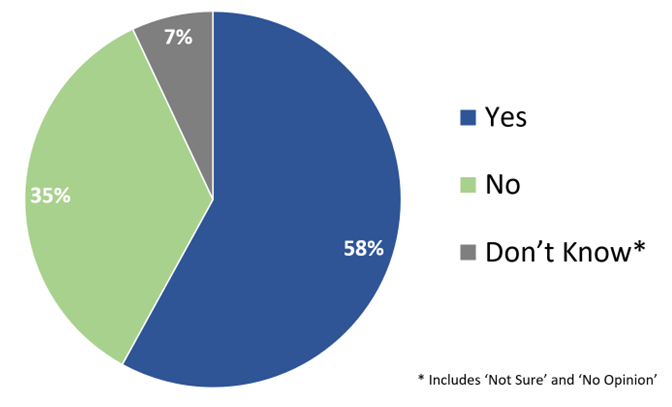
Figure 4. Do you have any concerns about the Protocol’s full operational scope and impact?
Those with concerns were then asked to indicate how concerned they were about nine issues corresponding to those that UK government highlighted in its July 2021 Command Paper as the justification for seeking changes to the Protocol and its implementation and the focus of ongoing discussions between the UK and the EU.[5]
The issue of most concern to this 58% of respondents is, as in June and October 2022, customs declarations for parcels being moved into Northern Ireland from Great Britain. Of those indicating concern, 64% indicate they are ‘highly concerned’ about this matter were the Protocol to be fully implemented. This translates to 37% of the total weighted sample of poll respondents being ‘highly concerned’ about such declarations. Two further issues attract the same overall level of concern: restrictions on plants and seeds being moved into Northern Ireland from Great Britain, and the jurisdiction of the EU Court of Justice (CJEU) under the Protocol. The figure of 37% is noticeably up on the 31-32% recorded in June and October 2022, possibly reflecting in the case of the CJEU the attention the UK government has been giving to the issue since the last poll.
Northern Ireland’s alignment with EU standards on goods is the issue of least concern to the 58% of respondents to the poll with concerns, and at 49% is markedly higher than in October 2022 (42%). For most other concerns there is a slight increase in the proportion of those being ‘highly concerned’ about the scope and impact of the Protocol if it were fully implemented. There is also a slight fall in those with no concerns on the alignment issue (16% against 20% and 22% in June and October 2022 respectively) and the jurisdiction of the EU Court of Justice (12% against 16% and 18% in June and October 2022 respectively).
The Protocol Among Other Concerns
As in the fourth poll conducted in February 2022, this latest poll sought respondents’ views on the relative importance of the Protocol compared to other topical issues of concern. In this poll there were five other issues: education and schools, the environment/climate change, the health service, the economy/cost of living, and transport and infrastructure. The issues of most concern to respondents overall are the health service (42%) and the economy/cost of living (31%) and then the Protocol (22%) (see Figure 5). For most respondents the Protocol is low down in their ranking of the six concerns: the majority (55%) rank it fifth or sixth, with 44% having it sixth.
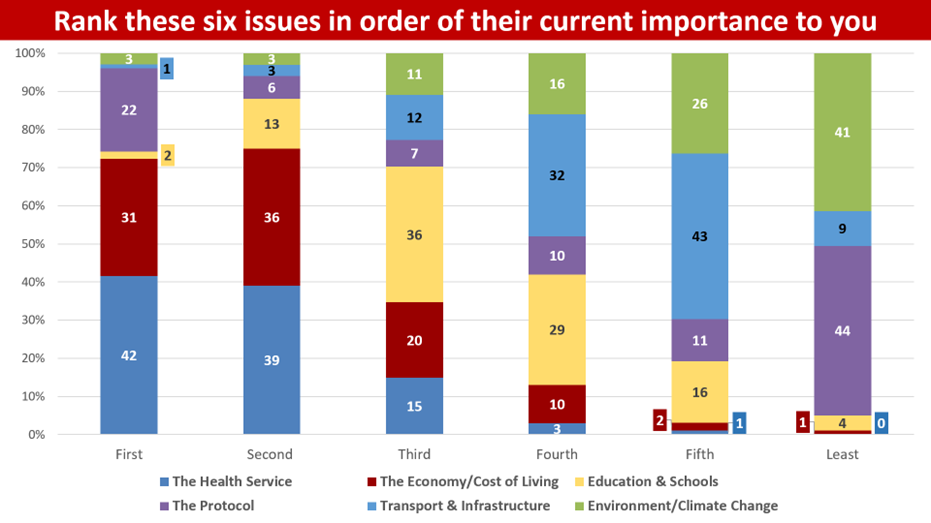
Figure 5. Ranking of Six Current Issues – All Respondents
Interestingly, when the responses are broken down in terms of male and female respondents, for males the Protocol (31%) is on a par with the health service (33%) and the economy/cost of living (30%) as their top concern (see Figure 6). For female respondents, however, the proportion ranking the Protocol as the issue of most concern is considerably lower (13%); the health service is rated the most important (52%). The differences between male and female respondents are also striking in that more than half (54%) of female respondents rank the Protocol of least importance compared to a third (34%) of male respondents.
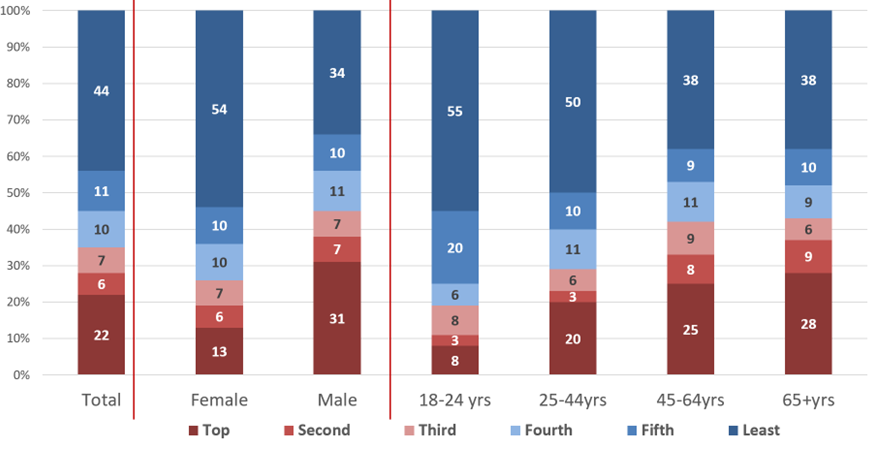
Figure 6. Ranking of The Protocol Relevant to Six Other Current Issues – Female/Male Responses and Responses according to Age
Where age is concerned, young voters are much less concerned about the Protocol than other age groups. The prominence of the Protocol as a matter of greater concern increases with the age of respondents. However, for all age groups, the Protocol features more often among the issues of lesser concern.
The same cannot be said when considering the breakdown of the results according to party support. The Protocol is the top concern of a majority of DUP (55%) and TUV (73%) voters (see Figure 7). UUP voters are split on where they rank the Protocol as a concern. For the clear majority of Alliance, SDLP and Sinn Féin supporters the Protocol is low down on their list of priority concerns.
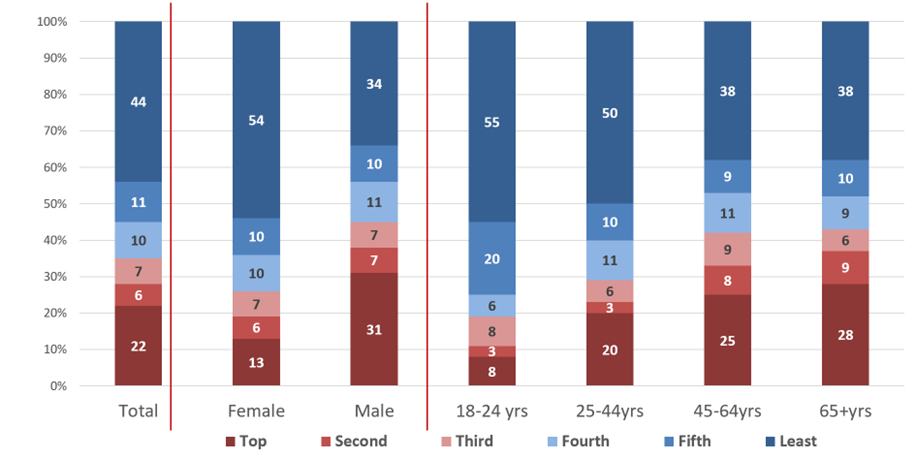
Figure 7: Ranking of The Protocol Relevant to Six Other Current Issues – Responses according to Party Support
Trust to manage the interests of Northern Ireland vis-à-vis the Protocol
Implementation of the Protocol involves a range of actors. As with all six previous polls, the only group that is trusted by a majority to manage the interests of Northern Ireland with respect to the Protocol are Northern Ireland’s business representatives (56%) (see Figure 8). The level of trust remains down on the 60% in June 2022, the highest figure to date.
Trust in the UK government when it comes to managing the interests of Northern Ireland with respect to the Protocol has dropped to its lowest level (3%) across the seven polls having been at its highest (7%) in October 2022. More than four fifths of respondents (85%) continue to distrust the UK government. Just short of a majority continue to distrust it ‘a lot’ (48%) although this is an improvement on the 55% in June 2022.
By contrast, trust to manage the Protocol in the interests of Northern Ireland has fallen slightly for the European Commission/EU from 47% in the last two polls to 44%; it has also fallen for the Irish government and more significantly, from 45% in October 2022 to 38%, the same level as in June 2021. However, views are sharply divided, with 44% distrusting the European Commission/EU and 46% distrusting the Irish government. Only around 10% of respondents hold no opinion on whether they can trust these actors or not.
Trust in the Northern Ireland Executive to manage the interests of Northern Ireland with respect to the Protocol remains strikingly low (14%). Only the UK Government suffers lower levels of trust. Given the absence of a functioning Northern Ireland Executive, this latest poll inquired into levels of trust/distrust in Northern Ireland civil servants. Respondents were almost equally split between trust (32%), distrust (35%) and being neutral on the question (32%). The marked increase noted in October 2022 in the proportion of respondents distrusting the Northern Ireland Executive to manage Northern Ireland’s interests – it increased to 52% – is confirmed (15%) in this latest poll.
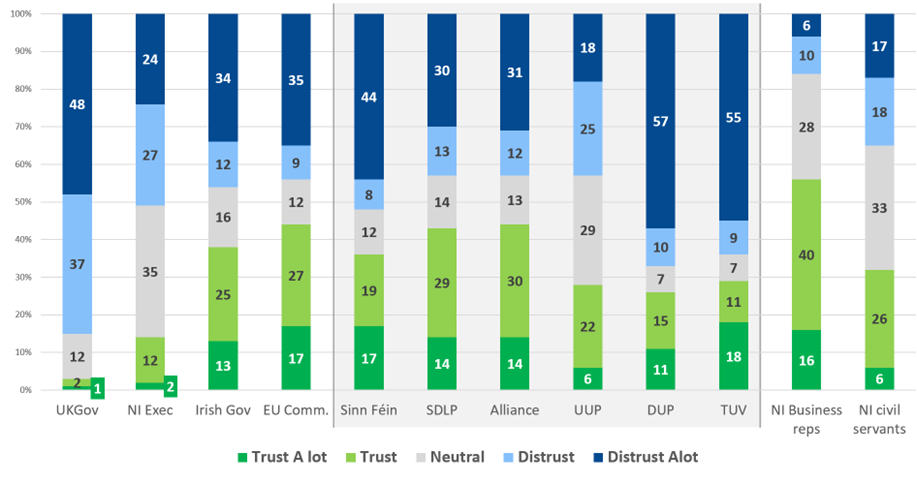
Figure 8. Levels of trust in/distrust of actors to manage the interests of Northern Ireland with respect to the Protocol
As for the five political parties that formed the last Northern Ireland Executive, the drop in the level of trust in the Alliance Party (from 50% to 42%) noted in the last report is confirmed (44%). It remains, along with the Social Democratic and Labour Party (SDLP) (43%), one of the two most trusted of the political parties considered here. Distrust in the SDLP remains at 43% – the same as for Alliance and for the Ulster Unionist Party (UUP). Trust in the UUP (28%) remains steady; around three-in ten respondents (29%) remain undecided on whether they trust the UUP to manage Northern Ireland’s interests on the Protocol. Two thirds of respondents (67%) continue to distrust the DUP, with a majority (52%) also distrusting Sinn Féin. In this poll, respondents were also asked to consider the extent to which the trust the Traditional Unionist Voice (TUV) to manage Northern Ireland’s interests on the Protocol. A majority (61%) distrust the TUV; 29% trust it.
Written comments on politics and political parties in Northern Ireland
Comments provided by respondents for this poll included some general and specific criticisms of politics in Northern Ireland. There was, however, significant criticism of the DUP, with comments in the optional written responses focusing on the party’s approach to the Protocol and its decision not to enter a new Executive in protest against the Protocol:
“The only real problem I see with the Protocol is the DUP lying about it to their voters”
“DUP should not be allowed to hold residents to ransom due to Protocol issues. They, like other parties, should be getting on with the job the taxpayers are paying them to do.”
“I hope the DUP lose the next election.”
“It is embarrassing and totally un-democratic how the DUP are behaving in refusing to engage because of the Protocol.”
“Please tell the DUP to get back to work and stop blocking the work of other elected representatives who are ready to meet their responsibilities.”
“To be held to ransom by the DUP is insufferable. The current arrangement in the Assembly where alignment is required is counterproductive to good government.”
Alongside comments directed at the DUP, a similar proportion of submitted comments stated general frustrations with the lack of fully functioning devolved government in Northern Ireland at present:
“NI needs a functioning government ASAP even if the Protocol issue is still ongoing”
“Stop MLAs pay who won’t sit in Executive”
“This country is being ruined by its politicians who are all following their own agenda regardless of the wishes of the electorate. The NHS is almost non-functional and other services are suffering as a result of the Executive not working. The Protocol is currently the least of peoples’ worries, as day-to-day living takes precedence for most people.”
“I believe the NI Executive should be up & running, regardless of the Protocol status – there are much more important issues to deal with”
“Health and education [are] far more important than the Protocol”
“Many thousands of families and communities are really really struggling. The cost-of-living crisis, housing crisis and mental health crisis are what is important…I feel strongly [that] an election should have happened by now and we need one immediately.”
Views expressed in the comments were, however, divided with a small number also stating support for the DUP’s refusal to enter into an Executive unless the Protocol is removed, a view shared by a third of voters, as discussed below.
“The Protocol should be removed before any power sharing can take place however long it takes.”
Also attracting some notable comment was the extent of misinformation around the Protocol and the lack of information available on the Protocol and the recent UK-EU discussions. As this and previous polls have indicated, around two in five respondents have concerns about the availability of reliable information on the Protocol (see Figure 1).
“We need much more detail on Protocol negotiations. What are the actual obstacles to coming to an agreement. We can judge for ourselves if we have this information.”
“The Protocol needs to be explained better by independent advisers.”
“I think many people don’t fully understand the Protocol and I would include myself. I also feel that many people’s position on Brexit and the Protocol is strongly influenced by political affiliation rather than its actual impact on the economy.”
Democratic consent and MLAs
The future of core provisions of the Protocol – those relating to the movement of goods and the single electricity market (i.e. Articles 5-10) – is subject to the democratic consent of members of the Northern Ireland Assembly in a vote that is to be held up to every four years. MLAs will first vote in November/December 2024.
Most respondents (92%) have a view on how they wish their MLAs to vote: 51% in favour of the continued application of Articles 5-10 and 41% against (see Figure 9). These are in line with the four previous polls and so once again confirm the marked gap in views that has emerged since the June 2021 poll when voters were split almost evenly (46% in favour and 45% against).
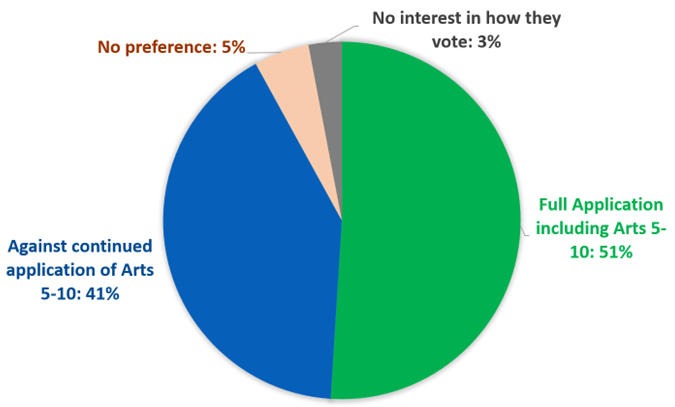
Figure 9. How would you like the MLAs you voted for in the most recent Assembly election to vote in the democratic consent vote on the Protocol in 2024?
These latest figures show considerable continuity in the positions expressed since our polling began in early 2021, although the margin between the two positions remains narrower than its largest to date in the June 2022 poll (see Figure 10).

Figure 10. Based on what you currently know, and are experiencing now, how would you like the MLAs for whom you vote[d] in the 2022 NI Assembly election to vote in 2024 on the Protocol? (%) - Views on the ‘democratic consent vote’ over the seven polls
As in most previous polls we asked how a candidate’s position on the Protocol might affect a respondent’s willingness to vote for them. If there were an election to the Northern Ireland Assembly in the next four months, the position of a candidate would be a factor for more than four fifths (82%) of respondents. Of these, just over a third (34%) would vote for candidates either opposed to consent in 2024 (12%) or wanting to see the Protocol scrapped (22%) (see Figure 11). This is down on the February 2022 poll when the proportion of respondents was 37% and a just over a quarter overall (27%) wanting the Protocol scrapped.
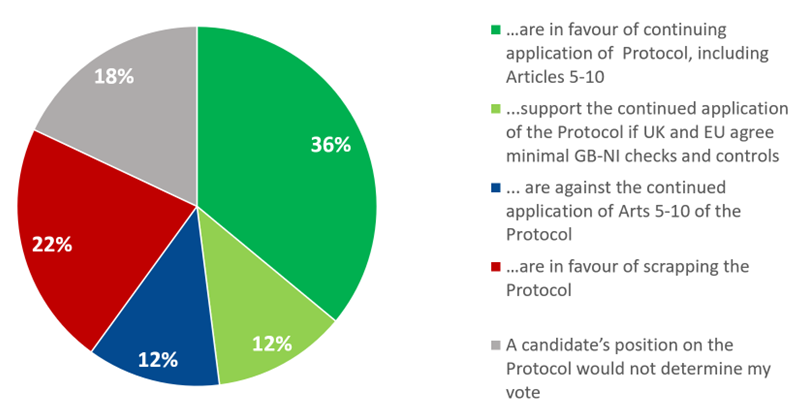
Figure 11. If an election to the NI Assembly were to take place in the next 4 months, how important would an MLA's position on the Protocol be to your vote?
In terms of support for consent in 2024, just over a third of respondents (36%) would vote for candidates in favour of the continued application of the Protocol, with the proportion rising to almost half (48%) if the UK and EU agree to minimal GB-NI checks and controls. When a similar question was asked in February 2022, 43% said they will only vote for candidates in favour of the continued application of Articles 5-10 of the Protocol. The response in this latest poll highlights the significance of the UK and EU reaching an agreement on ensuring that there are only minimal GB-NI checks and controls under the Protocol.
Agreement between the UK and the EU on reducing GB-NI checks and controls will be important for the 2024 democratic consent vote. Although 28% of respondents would still oppose the continued application of the Protocol, support for continued application could rise to 70% in the light of a UK-EU agreement (see Figure 12). However, this would depend significantly on whether there were minimal checks and what the implications were for Northern Ireland’s economy. These figures are in line with the results of the October 2022 poll.
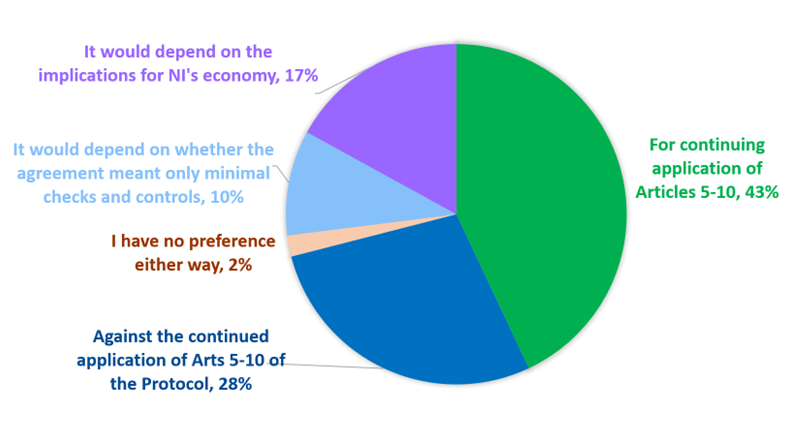
Figure 12. If the UK and the EU agreed a reduction on required checks and controls on goods moving from Great Britain to Northern Ireland, how would you like MLAs to vote in 2024 on the Protocol?
Public opinion on what might come next
The final section of the poll involved two sets of questions each asking respondents whether they agreed or disagreed with specific statements. The first set began with a question asked in each of the previous polls: whether the Protocol provides Northern Ireland with ‘a unique set of post-Brexit economic opportunities compared to the rest of the UK which if exploited could benefit Northern Ireland’. As already noted, three-fifths of respondents (62%) agree; three in ten disagree (see Figure 13).
The second question touched on the ‘green lane/red lane’ option for goods entering Northern Ireland from Great Britain by asking whether checks and controls are necessary (red lane) for goods having to meet EU standards so they can be sold on into the EU market. Half of respondents agreed, two-fifths disagreed.
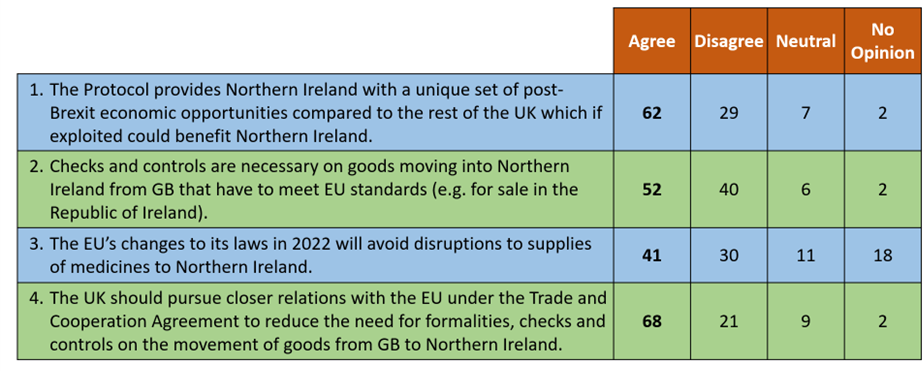
Figure 13. Issues Concerning the Protocol I
Respondents were also asked for their view on whether the EU’s changes to its laws in 2022 would avoid disruptions to supplies of medicines to Northern Ireland. Almost a third (29%) were either neutral in their response or had no opinion on the question, a possible reflection that it is too early to say. A similar proportion (30%) did not believe the disruptions will be avoided. The largest number of respondents (40%), although not a majority, thought that the EU’s changes to its law would avoid disruptions to supplies.
The fourth question returned to the issue of the need for formalities, checks and controls on the movement of goods from Great Britain to Northern Ireland and whether the UK should pursue closer relations with the EU to reduce these. A clear majority (68%) agree. Those disagreeing are generally those who support unionist political parties, although a majority of UUP supporters and one-in four of DUP supporters agreed on closer UK-EU relations to reduce checks and controls on the movement of goods from Great Britain to Northern Ireland (see Figure 14).
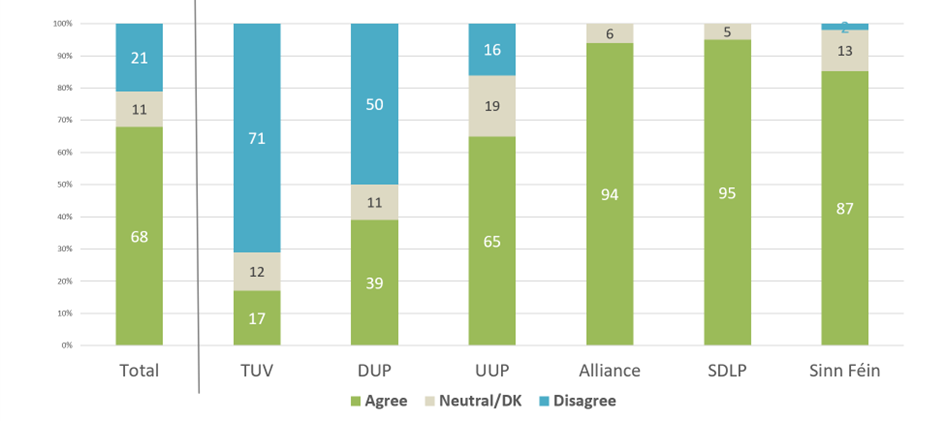
Figure 14. The UK should pursue closer relations with the EU under the Trade and Cooperation Agreement to reduce the need for formalities, checks and controls on the movement of goods from GB to Northern Ireland: Agree/Disagree (%)
The second set of questions focused on governance issues related to the Protocol with the first three questions asking respondents to consider statements relating to the Protocol and the ongoing absence of devolved government in Northern Ireland (see Figure 15). Whereas a third (34%) of respondents agreed with the proposition that power-sharing in Northern Ireland should not be restored until the Protocol is ‘removed’; a majority (61%) disagreed. A slightly larger majority (64%) were of the view that the Northern Ireland Executive should be ‘fully functioning regardless of what happens on the Protocol’. There has been little change in views on this issue since October 2022 when 65% agreed and 32% disagreed with the statement. On both occasions, the number of ‘neutral’ or ‘no opinion’ responses were low (≤ 4%). The third question asked respondents for their views on a further postponement of an election to the Northern Ireland Assembly because of ongoing UK-EU talks on the Protocol. The question was posed before the Secretary of State for Northern Ireland announced the postponement of an Assembly election until January 2024. A majority (61%) agreed that a ‘NI Assembly election should not be postponed again regardless of what is happening in UK-EU talks on the Protocol’. Just over a quarter (27%) disagreed.
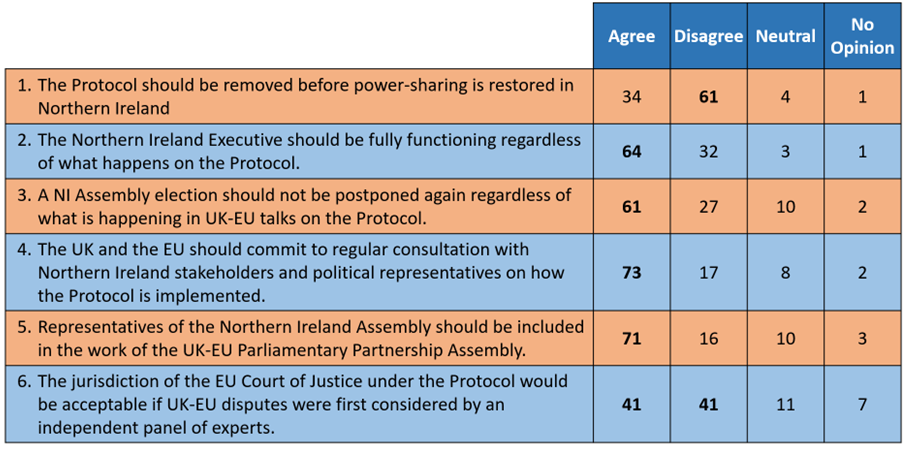
Figure 15. Issues Concerning the Protocol II: Governance
In terms of the operation of the Protocol, and as with previous polls, a clear majority of respondents (73%) are of the view that the UK and the EU should commit to regular consultation with Northern Ireland stakeholders and political representatives on how the Protocol is implemented. This includes substantial majorities from supporters of most Northern Ireland political parties and 50% of DUP supporters (see Figure 16). A clear majority of respondents overall (71%) also agree that representatives of the Northern Ireland Assembly should be included in the work of the UK-EU Parliamentary Partnership Assembly; for the most recent meeting in November 2022 the Northern Ireland Assembly was invited to send – and sent – two MLAs as observers.
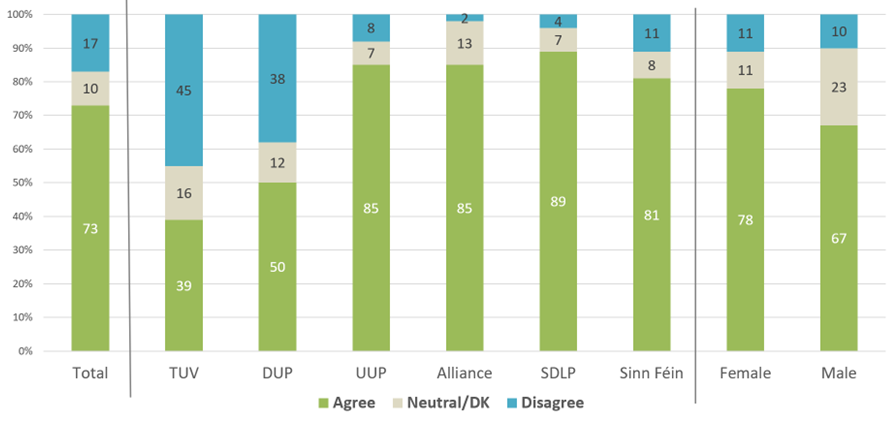
Figure 16. The UK and the EU should commit to regular consultation with Northern Ireland stakeholders and political representatives on how the Protocol is implemented.
And finally, on the role of the EU’s Court of Justice under the Protocol, respondents were evenly split (41% v 41%) on whether the jurisdiction of the Court would be acceptable if UK-EU disputes were first considered by an independent panel of experts.
***
The report is available to download here:
